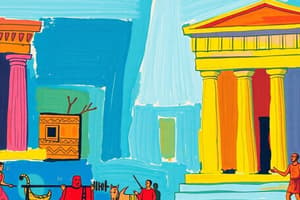Podcast
Questions and Answers
During which period did the city-states of Athens and Sparta experience their glory days?
During which period did the city-states of Athens and Sparta experience their glory days?
- Medieval Period
- Hellenistic Period
- Classical Period (correct)
- Archaic Period
Which ancient Greek philosopher is known for the Socratic method of questioning?
Which ancient Greek philosopher is known for the Socratic method of questioning?
- Plato
- Aristotle
- Pythagoras
- Socrates (correct)
What characterized the Archaic Period of ancient Greek history?
What characterized the Archaic Period of ancient Greek history?
- Flourishing of Athens and Sparta
- Conquests of Alexander the Great
- Emergence of the first democracies (correct)
- Founding of Minoan and Mycenaean civilizations
Where did Greek civilization originate from?
Where did Greek civilization originate from?
Which aspect was not a key factor that shaped Greek civilization according to the text?
Which aspect was not a key factor that shaped Greek civilization according to the text?
Who among the Greek philosophers focused on questions of justice, politics, and epistemology in his dialogues?
Who among the Greek philosophers focused on questions of justice, politics, and epistemology in his dialogues?
Which Greek philosopher laid the groundwork for natural sciences and classified the natural world?
Which Greek philosopher laid the groundwork for natural sciences and classified the natural world?
Which epic poems epitomize Greek mythology by detailing the Trojan War and Odysseus' journey home?
Which epic poems epitomize Greek mythology by detailing the Trojan War and Odysseus' journey home?
Which city-state was known for its democratic government and patronage of the arts?
Which city-state was known for its democratic government and patronage of the arts?
What was a fundamental aspect of Greek culture involving gods and goddesses, heroes, and epic tales?
What was a fundamental aspect of Greek culture involving gods and goddesses, heroes, and epic tales?
Flashcards are hidden until you start studying
Study Notes
Greek Civilization: An Overview
Nestled along the shores of the Mediterranean, the Greek civilization blossomed from the golden sands of the Aegean, tracing its roots back more than 3,000 years. As you delve into this fascinating era, you'll encounter four key aspects that shaped the Greeks into a formidable force in the world: ancient Greek history, Greek philosophers, Greek mythology, and Greek city-states.
Ancient Greek History
The heartbeat of Greek civilization began in the Bronze Age, with the Minoan and Mycenaean civilizations laying the groundwork for the flourishing city-states that would follow. The Archaic Period (750-480 BCE) saw the emergence of the first democracies, while the Classical Period (480-323 BCE) marked the glory days of Athens and Sparta, as their respective ideologies, the Athenian democracy and Spartan militarism, vied for dominance. The Hellenistic Period (323-31 BCE) witnessed the conquests of Alexander the Great, ushering in a spread of Greek culture across the known world.
In terms of trade, the Greeks were adept seafarers who exploited the Mediterranean's resources, establishing commercial ties that spanned from the Black Sea to the Western Mediterranean.
Greek Philosophers
The quest for knowledge and understanding of the world was at the core of Greek philosophy. Philosophical thought and inquiry flourished in Greek culture, with seminal figures such as Socrates, Plato, and Aristotle constructing the framework for Western philosophy. Socrates, through his dialectic method, sought to discover the nature of the good life, while Plato, in his dialogues, grappled with questions of justice, politics, and epistemology. Aristotle, a student of Plato, delved into the natural world, laying the groundwork for natural sciences and classifying the natural world.
Greek Mythology
The rich tapestry of Greek mythology, with its gods and goddesses, heroes, and epic tales, was a fundamental aspect of Greek culture. The Greek pantheon featured twelve principal deities presiding over various aspects of life, complemented by a plethora of lesser gods and goddesses. The epic poems of Homer, the "Iliad" and "Odyssey," epitomize Greek mythology, detailing the Trojan War and Odysseus' journey home, respectively. Greek myths were not merely tales of gods and heroes; they also functioned as allegories, embodying human aspirations and frailties.
Greek City-States
The Greek city-states, or poleis, were the cornerstone of the Greek civilization, with each polis acting as an independent political, military, and cultural entity. City-states such as Athens and Sparta, each with their own distinctive ideologies and unique forms of governance, competed for influence in the Greek world. Athens, with its democratic government and patronage of the arts, served as a beacon of freedom, while Sparta's militaristic society was a pinnacle of discipline and order. The city-states' distinctiveness fostered a vibrant exchange of ideas, allowing for an environment that nurtured the arts, philosophy, and science.
The Greek civilization was a dynamic amalgamation of history, philosophy, mythology, and city-states that laid the foundation for the Western world's cultural and intellectual development. As you explore the depths and breadth of this enchanting era, you'll come to appreciate the profound impact it had on shaping our world.
Studying That Suits You
Use AI to generate personalized quizzes and flashcards to suit your learning preferences.





